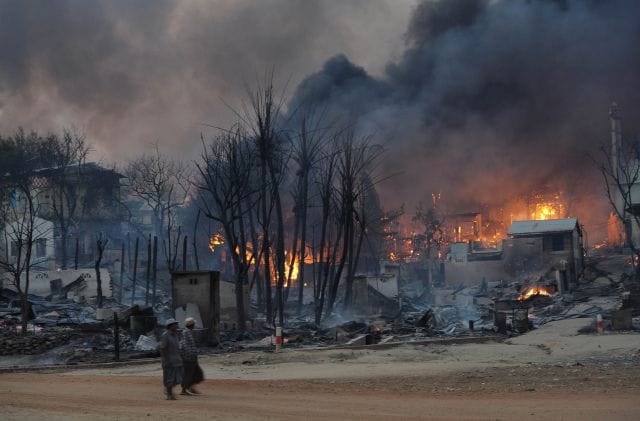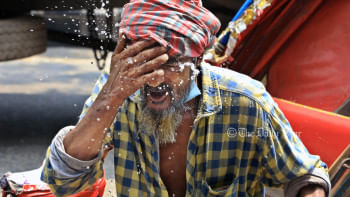Religious 'radicals' driving Myanmar unrest: experts
Two years after a repressive junta ceded power, Myanmar is grappling with a surge in religious extremism that experts trace to anti-Muslim "provocateurs" including radical Buddhist monks.
At least 43 people have been killed while mosques and Muslim homes have been destroyed over the past fortnight in central Myanmar, in a wave of violence that witnesses say seems to have been well organised.
"It is clear that there are some agents provocateurs with radical anti-Muslim agendas at work in the country -- including influential Buddhist monks preaching intolerance and hatred of Muslims," said Jim Della-Giacoma, a Myanmar expert with the International Crisis Group think-tank.
"Also, the systematic and methodical way in which Muslim neighbourhoods were razed to the ground is highly suggestive of some degree of advance planning by radical elements," he added.
Monks -- once at the forefront of the pro-democracy movement and viewed with reverence in this devout Buddhist-majority nation -- have been linked to the unrest.
Some members of the clergy have been involved in the violence, while others are spearheading a move to shun shops owned by Muslims and only visit stores run by Buddhists, identified by stickers showing the number "969", which has become a symbol of their campaign.
More moderate voices among civil society activists and religious leaders are calling for the country to defuse violence that has cast a shadow over the Buddhist-majority nation's political reforms.
The apparent spark for the recent violence was an argument in a gold shop in the town of Meiktila on March 20 that escalated into a full-scale riot.
Since then armed gangs have roamed from town to town in central Myanmar razing mosques and Muslim homes.
It follows Buddhist-Muslim clashes in the western state of Rakhine last year that left at least 180 people dead, mostly minority Muslim Rohingya who are viewed by many Burmese as illegal Bangladeshi immigrants.
A wave of hate has swept across social media websites targeting the Rohingya, who have long been denied citizenship by Myanmar's government, which -- like many Burmese -- refers to them as "Bengalis".
Recently, however, the violence has also targeted Muslims with Myanmar citizenship, some of whose families came to the country more than a century ago from India, Bangladesh or China.
Speaking to AFP, monk Wirathu denied that he was against all Muslims, and said the "969" movement was unrelated to the recent unrest.
"We just targeted Bengalis who are terrorising ethnic Rakhine (Buddhists)," the 45-year-old said.
"We are just preaching to prevent Bengalis entering the country and to stop them insulting our nationalities, language and religion," he added.
In an effort to stem the violence, the government has declared a state of emergency and deployed troops in the worst-hit areas.
The United Nations' human rights envoy to the country, Tomas Ojea Quintana, has said the reluctance of security forces to crack down on the unrest suggests a possible state link to the fighting -- comments rejected by Myanmar.


 For all latest news, follow The Daily Star's Google News channel.
For all latest news, follow The Daily Star's Google News channel. 



Comments